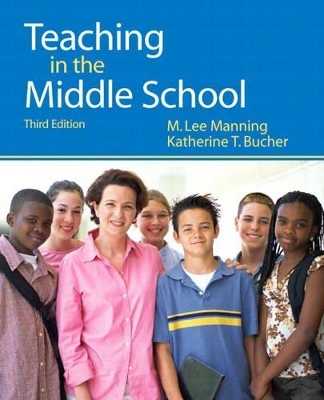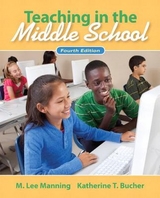
Teaching in the Middle School with MyEducationLab
Allyn & Bacon
978-0-13-814372-5 (ISBN)
- Titel erscheint in neuer Auflage
- Artikel merken
PART I UNDERSTANDING MIDDLE SCHOOLS AND YOUNG ADOLESCENTS
1. Middle Schools Today - Concepts and Teaching
Scenario - The First Day of Student Teaching
Overview
Objectives
A Brief History of the Junior High School and the Middle School
Middle Schools
Middle Schools: Today and Tomorrow - Selected Concepts
Directions for Effective Middle Schools
Teaching in the Middle School: Questions to Consider
2. Young Adolescents - Development and Issues
Scenario - Ms. Ortega Reflects
Overview
Objectives
Generalizations About Development - The Need for Caution
Young Adolescent Development
Physical Development
Psychosocial Development
Cognitive Development
3. Guiding Young Adolescents - Teachers and Counselors
Scenario - Kim Matusi and the Guidance Team
Overview
Objectives
Guidance in Middle Schools
Differences Between Elementary and Secondary Schools
Functions of Middle School Guidance Programs
Guidance for a Diverse Population
Team and Collaborative Approaches to Guidance
Adivsor-Advisee Programs
Roles of Teachers, Counselors, and Administrators
Guidelines for Effective Advisory Programs
Advisory Plans
Need for Specialized Services
PART II DEVELOPING THE CURRICULUM AND ORGANIZING THE SCHOOL
4. Middle School Curriculum - Core and Related Domains
Scenario - The Williams Middle School Curriculum Committee
Overview
Objectives
Curriculum Definitions
Curriculum Frameworks
Curriculum Standards
Developmentally Responsive Middle School Curriculum
Core Curriculum
Related Domains
5. Middle School Curriculum - Integrated, Interdisciplinary, and Exploratory
Scenario - Mr. Costa Considers the Curriculum
Overview
Objectives
Contemporary Curriculum Perspectives and Definitions
Integrated Curriculum
Additional Information
Exploratory Curriculum/Programs
Selected Considerations for Developing Middle School Curriculum
PART III PLANNING, IMPLEMENTING, AND ASSESSING INSTRUCTION
6. Planning Instruction - Appropriate and Interdisciplinary
Scenario - Karyn Rothmer's Journal
Overview
Objectives
Rationale for Detailed and Methodical Planning
Factors Affecting Middle School Instructional Planning
Interdisciplinary Team Organization and Interdisciplinary Instruction
Interdisciplinary Instructional Planning
7. Implementing Instruction - Methods and Materials
Scenario - A First-Year Teacher Needs Help
Overview
Objectives
Young Adolescents - Implementing Considerations
Organizing for Instruction
Implementing Interdisciplinary Team Teaching
Implementing Effective Instruction in Middle Schools
Related Domains
Activities Based on Personal Experiences
Using Effective Teaching Behaviors
Selecting Instructional Methods and Strategies
Special Characteristics of Middle School Teachers
Instruction for Special Learners
8. Assessment of Learning - Methods and Issues
Scenario - Changes at Longview Middle School
Overview
Objectives
Assessment Terminology - Definitions
Assessment of Learning - Perceptions
Assessment - Rationale and Purposes
Assessment - Traditional Methods
Authentic-Alternative Assessments
Assessment - Evaluation of Traditional and Authentic Assessments
Assessment - Reporting
Assessment - Developmentally Responsive in Middle Schools
Assessment - Issues
9. Managing Young Adolescents and Environments - Strategies and Techniques
Scenario - Westview Middle School Educators Tackle the School Environment
Overview
Objectives
Understanding Positive Middle School Learning Environments
Designing Positive Middle School Learning Environments
Classroom Management in the Middle School
Understanding Selected Classroom Management Theorists
Developing a Personal Theory of Classroom Management
PART IV WORKING WITH EXTERNAL COMMUNITIES
10. Parents, Families, and Community Members - Partners and Resources
Scenario - Encouraging Community Involvement
Overview
Objectives
Reengaging Parents and Families in Middle Schools
Backgrounds
Parents and Middle Schools
Nontraditional Families; and Fathers
Parent Education Programs for Parents of Young Adolescents
Communities and Young Adolescents
Epilogue Middle Schools of the Future
Middle Schools: The Beginning and Rationale
Documents, Position Papers, and Reports
Directions
Present Status
Young Adolescents
Recognition of the Developmental Period
Increasing Research Base
Contemporary Perspectives
Teaching in the Middle Schools - Challenges
Seeking Professional Preparation: Young Adolescents and Middle School Education
Committing to Teacher Middle Schoolers
Serving as Advocates for Young Adolescents
Providing Developmentally Responsive Educational Experiences
Engaging in Research to Determine What Works
The Future
Push for Excellence
Collaborative Efforts - Administrators, Teachers, Teacher Educators, Parents, State Departments of Education, and the Community
A Time for Responsive Action
Glossary
References
Name Index
Subject Index
| Erscheint lt. Verlag | 22.11.2010 |
|---|---|
| Verlagsort | Old Tappan |
| Sprache | englisch |
| Gewicht | 544 g |
| Themenwelt | Sozialwissenschaften ► Pädagogik |
| ISBN-10 | 0-13-814372-2 / 0138143722 |
| ISBN-13 | 978-0-13-814372-5 / 9780138143725 |
| Zustand | Neuware |
| Informationen gemäß Produktsicherheitsverordnung (GPSR) | |
| Haben Sie eine Frage zum Produkt? |
aus dem Bereich



